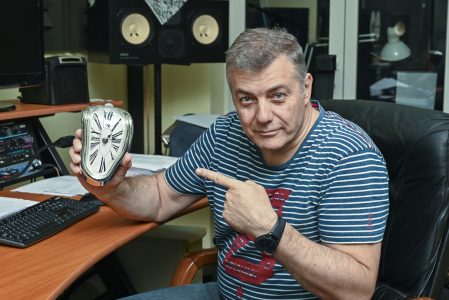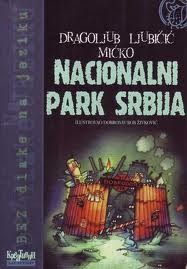Politicians did not take my job from me. On the contrary, they give me enough material to work although I have never asked them to. I would love to have less of this kind of material, and for the situation to be normal so I can do less satire and more pure humour on stage. Then the laughter wouldn’t be so bitter

Through numerous shows and character portrayals, Dragoljub Ljubičić Mićko gives a memorable interpretation of the drab reality and tragicomic features of the current government in Serbia with the use of humour, a valuable tool and medicine that preserves mental health. In this interview, Dragoljub Ljubičić Mićko tells us how he managed to keep this going for decades.
Do you sometimes feel as if politicians took your job?
— Well, Serbian politicians often come across as silly while trying to be serious, or worse – while trying to be funny. And they look silly because they are politically clumsy and for the most part, not equipped to do their job. It is a very rare occurrence for an official to carry a certain function because they are knowledgeable and experienced. They usually get a job because they are a member of a certain political party. By doing such a serious job in a silly manner, and we are talking about jobs that strongly affect the quality of life of every citizen, they are inadvertently offering themselves to satire. This has been my personal mission for decades; namely, to try to explain and dissect the absurdity of the Serbian political scene for ordinary people in a humorous and often bitter way. Since it’s easier to digest that in a form of show, you can say that I’m SHOWing the absurdity of Serbian politics. To answer your question… No, the politicians did not take my job. On the contrary, they give me enough material to work although I have never asked them to. I would love to have less of this kind of material and for the situation to be normal so I can do less satire and more pure humour on stage. Then the laughter wouldn’t be so bitter.
You started your career in 1984. Could you compare your work from the 1990s with what you do today?
— The 1990s were the premiere of our social and political downfall, and today we are having a re-run. The only difference is that the re-run in certain segments is edited, so to speak, because not everything is identical to the 1990s, but it certainly is very reminiscent of that age. This tragic downfall of ours does not contain all the same dramatic elements. Some are different, and so are ‘the actors’. In the 1990s, the biggest wars were fought with arms, guns blazing and people being killed. There was also a war in the media, but the real war, with guns, was simply more noticeable and deadly. Today, there are fewer real wars, except for mafia showdowns in the streets, but we are certainly still waging a media war, or rather verbal shooting, fighting, wounding, virtual mutilations and burials are now taking place in tabloids. From tabloids, all of this spilt over into press rooms and into endless guest appearances of top politicians in morning shows at TV stations that have a national frequency. And then there’s social media.
How difficult is to do humour and satire today? You’ve been doing both for many years and in different media outlets – on stage, TV, by writing books, being in advertisements etc.
— Yes, a part of what I do is pure humour, devoid of social and political commentary, while the other part is pretty much drenched in such commentary which makes it satirical and to a lesser or bigger degree, humorous. In this case, humour is just seasoning. Apart from advertisements, that are apolitical and funny, I can give you an example of my work as a pure humorist – it’s a play called “One Stvari”, that talks about relations between men and women. The play is not only entertaining in a sexual therapy kind of way but is also matrimonially educational. Any couple living together can identify with the play’s theme. On the other hand, I’ll give you an example of my satirical work – the play “Danas Nam je Divno Dno” – which is pretty gritty and politically engaging. In the play, we talk a lot about the former Prime Minister – current President, and this proved to be a problem when booking venues in Serbia. In smaller places, all venues were already mysteriously booked long in advance, so we managed to stage the play only in Belgrade and several other bigger towns in Serbia, just 25 times in total. “Danas Nam je Divno Dno” is really a hilarious satirical and humouristic event that leaves nobody indifferent. Maybe we will do it again soon, who knows? Of course, the most recent thing and probably the most politically engaging is what I do with (Voja) Žanetić and (Dragoljub) Petrović. It’s a show called “PLjiŽ” that is aired on N1 TV. We have just finished the third season. For you who don’t watch N1, you can find the show on my YouTube channel, ‘Mićko Ljubičić Official Channel” and on Facebook. Ha! I am advertising myself here, and you didn’t even blink.

You have been collaborating with Voja Žanetić for many years and you are now joined by Draža Petrović. Do you get along well?
— I have known Žanetić for 35 years, ever since I came to Index Radio Theatre. Petrović and I had not worked together before he agreed to be my guest on LEKOVITI SHOW. But we got along very well pretty quickly. Apart from being the letter “P” in the show’s name “PLjiŽ”, he brought his own way of satirical thinking that was different to what Voja and I had been building for years and what we were known for. He is also the youngest of the three of us, so he downs our average age a little bit.
How do you put the show together? How do you pick the topic among a myriad of topics today? What is the feedback of the audience?
— We pick topics with the help of our standing collaborator, Boris Husović who regularly buries us in information about the events that took place between two shows that are deserving of airtime. Since, as you have noticed, there are so many of these events, the three of us select a few of them in terms of their importance and how good of a material they are. I also have another activity which is to write the Goodnight Story, apart from the commentaries. In addition to the Goodnight Story and commentaries, I take special care of impersonations, sketches and songs. Sketches are sometimes scripted, and sometimes we improvise on a given theme. The same goes for impersonations, for they depend upon my ability to catch a certain character. As for the songs, Voja and I often collaborate writing satirical lyrics in “PLjiŽ”. Working on sketches is different because in order to get Žanetić to give us 100% sincere laughter – because he wouldn’t be able to fake his infectious laughter even if he tried to – he mustn’t find out what my lines are before the show. So, there are no rehearsals in that segment, unlike in the commentary segment which we read beforehand. The result is sometimes edgy, sometimes easygoing, sometimes bitter, and sometimes hilarious. The feedback of the audience? We couldn’t dream of a better reception, really. Still, the most important thing to me is that this is well-received by people whose opinions and taste I value. And I’m sure that there are people who don’t like this concept. But the main thing is that the three of us feel good when we are doing the show, and since we are all experienced, we can tell when something is good or not. We are now a well-rehearsed team that needs less and less time to select, satirically process, say, act, joke, or sing a part of our social and political reality. It is a special challenge to condense in 30 minutes something that happened over a period of one week.
What do you think of the current relations between the state authorities and the opposition? Is there any dialogue between them or there is more work to be done?
— There is as much dialogue between them as there is between a hunter and a hare in the woods during the hunting seasons. The hunter’s gun… Sorry, not the gun, but the heavy media artillery that ‘the hunter’ possesses, is something that makes dialogue impossible. In order to have a dialogue, you need two sides, sitting opposite of each other and talking or doing all of that but in the parliament. This has not happened in our political life for quite a long time. It is usually the government’s fault because of that, regardless of who is in power, because it is the government that controls the majority of the media. Since many of the current opposition figures had been in power before, while the current government was the opposition, all of them know all too well how to sustain each other on the political scene.
Were you scared when certain government ministers threatened with hunger strike as a counter-measure to the opposition’s strike?
— Oh, I did. I really got scared that certain individuals from the government would be victimized by the opposition bloc and that, due to this principled hunger strike, they would lose their health, seriously jeopardize their life and that I no longer would be able to use them as material for my work. However, we were all stunned with how quickly this hunger strike started and how quickly it ended. So, they clearly and strongly demonstrated their readiness to stop eating for the sake of their higher goals. Until they got hungry.
NATIONAL PARK SERBIA
You also wrote a two-part book called ‘Nacionalni Park Srbija’ (‘National Park Serbia’). How current are these books today?
 — The first book titled ‘Nacionalni Park Srbija’ came out in 1999 and without advertising it, the book started selling at an incredible pace of 2,000 copies a week. A total of 13 subsequent editions of this book were released which is well over 100,000 legally sold copies. I use the term “legally”, because, after we released the third edition, we found out there was a bootleg copy circulating. The person who printed and sold these bootleg copies was arrested later and as it turned out, he managed to sell close to 30,000 copies in the street. Seven years later, in 2007, I wrote the second part titled “Nacionalni Park Srbija 2 – POLUSMAK POLUSVETA” to show what, in which way and how much had changed in the meantime. Although the sequel did not repeat that marvellous sales success of the first book, many people have been quoting parts of it, today more than ever. Some phrases from the second book or rather from a CD that was sold with it, have become a staple in a colloquial speech a long time ago. For instance, in the book, there is a character called Mica Ubica or “a feral civil servant” whose terrorizing attitude towards people who come to her counter became a paradigm for bureaucracy in Serbia. And her line “FT1P” (“Fali Ti 1 Papir”, in translation “You need one more paper”) was widely quoted among the readers and became probably the most famous and most frequently used bureaucratic-terrorizing abbreviation in Serbia. Unfortunately, both books are still very current in this country, to the minute detail. They are also current not only in Serbia, but, judging by the e-mails I got from readers from ex-Yugoslavia, in which they write about a similar or even identical situation in their respective countries, the word “Serbia” in the book’s title could be easily replaced with “Montenegro”, “Croatia”, “Bosnia and Herzegovina” or “Macedonia”.
— The first book titled ‘Nacionalni Park Srbija’ came out in 1999 and without advertising it, the book started selling at an incredible pace of 2,000 copies a week. A total of 13 subsequent editions of this book were released which is well over 100,000 legally sold copies. I use the term “legally”, because, after we released the third edition, we found out there was a bootleg copy circulating. The person who printed and sold these bootleg copies was arrested later and as it turned out, he managed to sell close to 30,000 copies in the street. Seven years later, in 2007, I wrote the second part titled “Nacionalni Park Srbija 2 – POLUSMAK POLUSVETA” to show what, in which way and how much had changed in the meantime. Although the sequel did not repeat that marvellous sales success of the first book, many people have been quoting parts of it, today more than ever. Some phrases from the second book or rather from a CD that was sold with it, have become a staple in a colloquial speech a long time ago. For instance, in the book, there is a character called Mica Ubica or “a feral civil servant” whose terrorizing attitude towards people who come to her counter became a paradigm for bureaucracy in Serbia. And her line “FT1P” (“Fali Ti 1 Papir”, in translation “You need one more paper”) was widely quoted among the readers and became probably the most famous and most frequently used bureaucratic-terrorizing abbreviation in Serbia. Unfortunately, both books are still very current in this country, to the minute detail. They are also current not only in Serbia, but, judging by the e-mails I got from readers from ex-Yugoslavia, in which they write about a similar or even identical situation in their respective countries, the word “Serbia” in the book’s title could be easily replaced with “Montenegro”, “Croatia”, “Bosnia and Herzegovina” or “Macedonia”.